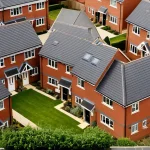Actionable Steps for a Sustainable Living Space in the UK
Creating a sustainable living space in the UK starts with practical, achievable actions tailored to local needs. Homeowners can begin by focusing on improving energy efficiency—key to reducing carbon footprints in the often cool and damp UK climate. Simple steps like upgrading insulation and sealing draughts reduce heat loss, helping homes stay warmer without excessive energy use.
When setting up an eco-friendly home, consider incorporating practical eco-friendly tips UK residents can easily apply. These include using LED lighting, energy-efficient appliances, and mindful energy consumption habits. For instance, turning off unused devices and utilizing smart meters can optimize energy use effectively.
Also to read : How can you design a UK home office for productivity?
Addressing UK-specific challenges, such as variable weather and housing stock diversity, requires adaptable solutions. Older homes may need different approaches compared to newer builds. Opportunities exist in tapping into government schemes promoting energy-efficient homes UK, often offering financial incentives for upgrades.
In summary, focusing on insulation, practical energy-saving measures, and leveraging UK-specific resources form a robust foundation toward a more sustainable home. This hands-on approach empowers homeowners to make gradual, impactful changes aligned with the broader goal of sustainable living UK-wide.
Also to discover : How can you incorporate vintage elements into your UK home decor?
Enhancing Energy Efficiency in Your Home
Improving energy efficiency UK is crucial for reducing bills and cutting carbon emissions. Start with insulation UK, focusing on lofts, walls, and floors to keep your home warmer. Sealing draughts around windows and doors also minimizes heat loss, which is essential given the UK’s cooler climate. These practical eco-friendly tips UK not only improve comfort but directly reduce energy consumption.
Choosing energy-efficient appliances rated highly for energy use ensures you’re not wasting power. Opt for LED lighting—these use up to 80% less energy than traditional bulbs and last much longer. Smart meters and energy monitors can help track real-time energy use, making it easier to identify wasteful habits and adjust accordingly.
Reducing home energy use means combining these measures for maximum effect. For example, pairing effective insulation with energy-efficient heating systems significantly lowers fuel needs. While older homes may require more extensive upgrades, even small steps contribute. Embracing practical eco-friendly tips UK tailored to the property type addresses variability across the UK’s diverse housing stock, supporting sustainable living UK goals in a meaningful way.


